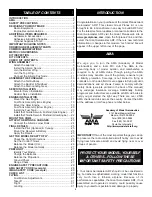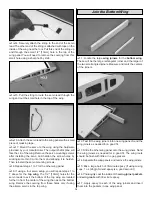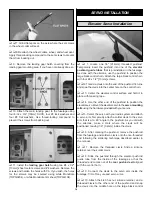
2. You must assemble the model according to the
instructions. Do not alter or modify the model, as doing so
may result in an unsafe or unflyable model. In a few cases
the instructions may differ slightly from the photos. In those
instances the written instructions should be considered
as correct.
3. You must take time to build straight, true and strong.
4. You must use an R/C radio system that is in first-class
condition, and a correctly sized engine and components
(fuel tank, wheels, etc.) throughout the building process.
5. You must correctly install all R/C and other components
so that the model operates correctly on the ground and in
the air.
6. You must check the operation of the model before every
flight to insure that all equipment is operating and that the
model has remained structurally sound. Be sure to check
clevises or other connectors often and replace them if they
show any signs of wear or fatigue.
7. If you are not an experienced pilot or have not flown this
type of model before, we recommend that you get the
assistance of an experienced pilot in your R/C club for your
first flights. If you’re not a member of a club, your local hobby
shop has information about clubs in your area whose
membership includes experienced pilots.
8. While this kit has been flight tested to exceed normal use, if
the plane will be used for extremely high-stress flying, such as
racing, or if an engine larger than one in the recommended
range is used, the modeler is responsible for taking steps to
reinforce the high-stress points and/or substituting hardware
more suitable for the increased stress.
9. WARNING: The cowl, wheel pants and wing struts
included in this kit are made of fiberglass, the fibers of which
may cause eye, skin and respiratory tract irritation. Never
blow into a part (wheel pant, cowl) to remove fiberglass
dust, as the dust will blow back into your eyes. Always wear
safety goggles, a particle mask and rubber gloves when
grinding, drilling and sanding fiberglass parts. Vacuum the
parts and the work area thoroughly after working with
fiberglass parts.
Remember: Take your time and follow the instructions to
end up with a well-built model that is straight and true.
This is a partial list of items required to finish the Giant
Aeromaster ARF that may require planning or decision
making before starting to build. Order numbers are provided
in parentheses.
The Giant Aeromaster ARF has different setup options for
the ailerons and elevator functions that will alter the radio
gear required for completion. Below is a quick reference of
the BASIC radio gear needed for each setup. There may be
many other options depending on your radio of choice.
Note: If you are using a gas engine instead of glow powered
for this model, we recommend using a PCM dual conversion
receiver to help alleviate interference.
Option 1: Two wing servos.This option will require the following:
❏
4-channel radio
❏
Six standard size servos capable of at least 70 oz-in of
torque, such as Futaba
®
S9202 (FUTM0090) or S3050
Digital servos (FUTM0300)
❏
Reversing Y-harness for elevator servos (FUTM4150)
for elevators
❏
Dual servo extension for bottom wing aileron
servos (FUTM4130)
❏
Two 20" [508mm] minimum length servo extensions
(FUTM4147 for bottom wing servos)
❏
FM or PCM Dual Conversion receiver
Option 2: Four Wing Servos. This option will require the
following in addition to or upgraded from the above items:
❏
6-channel computerized radio (mixing features will
be required)
❏
Two additional servos, standard size capable of at least
50 oz-in of torque for top wing servos, such as Futaba
S9001 (FUTM0075)
❏
Two 20" [508mm] minimum length servo extensions
(FUTM4147 for top wing servos)
❏
Y-Harness for the top wing aileron servos (HCAM2751
for Futaba)
❏
Minimum 6-channel FM or PCM receiver for basic setup
Option 3: All-Out Computerized Option. This is for those
with advanced mixing function radio setups.
❏
9-channel computerized radio with 9-channel dual
conversion FM or PCM RX
❏
Eight servos total, (4-aileron, 2-elevators, 1-rudder,
1-throttle)
❏
Six 20" [508mm] minimum length servo extensions for
top and bottom wing servos (FUTM4147)
• two connected to top wing aileron servo leads to
exit wing
Radio Equipment
DECISIONS YOU MUST MAKE
We, as the kit manufacturer, provide you with a top quality,
thoroughly tested kit and instructions, but ultimately the
quality and flyability of your finished model depends on how
you build it; therefore, we cannot in any way guarantee the
performance of your completed model, and no
representations are expressed or implied as to the
performance or safety of your completed model.
3




































